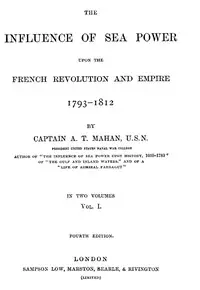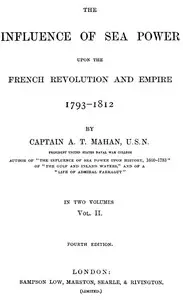"The Influence of Sea Power upon the French Revolution and Empire 1793-1812" by Captain A.T. Mahan is a historical study that examines how control of the seas dictated the course of the French Revolution and the Napoleonic era. Written in the late 1800s, the book begins by setting the scene in 1793, describing the state of Europe after the American Revolution when increasing tensions rise between France, Great Britain, and Austria. It describes how internal problems in France, the death of King Louis XVI, and the new French Republic's declarations of war led to major battles on both land and sea, and demonstrates the key role sea power played in deciding the outcomes of these major historical affairs.

The Influence of Sea Power upon the French Revolution and Empire 1793-1812, vol 1
By A. T. (Alfred Thayer) Mahan
Witness how naval dominance shaped the fate of nations as revolutionary France clashed with empires for control of the world.
Summary
About the AuthorAlfred Thayer Mahan was a United States naval officer and historian, whom John Keegan called "the most important American strategist of the nineteenth century." His 1890 book The Influence of Sea Power Upon History, 1660–1783 won immediate recognition, especially in Europe, and with the publication of its 1892 successor, The Influence of Sea Power Upon the French Revolution and Empire, 1793–1812, he affirmed his status as a globally-known and regarded military strategist, historian, and theorist. Mahan's works encouraged the development of large capital ships — eventually leading to dreadnought battleships — as he was an advocate of the 'decisive battle' and of naval blockades. Critics, however, charged him with failing to adequately explain the rise of largely land-based empires, such as the German or Ottoman Empires, though Mahan did accurately predict both empires' defeats in World War I. Mahan directly influenced the dominant interwar period and World War II-era Japanese naval doctrine of the "decisive battle doctrine" , and he became a "household name" in Germany. He also promoted American control over Hawaii though he was "lukewarm" in regards to American imperialism in general. Four U.S. Navy ships have borne his name, as well as various buildings and roads; and his works are still read, discussed, and debated in military, historical, and scholarly circles.
Alfred Thayer Mahan was a United States naval officer and historian, whom John Keegan called "the most important American strategist of the nineteenth century." His 1890 book The Influence of Sea Power Upon History, 1660–1783 won immediate recognition, especially in Europe, and with the publication of its 1892 successor, The Influence of Sea Power Upon the French Revolution and Empire, 1793–1812, he affirmed his status as a globally-known and regarded military strategist, historian, and theorist. Mahan's works encouraged the development of large capital ships — eventually leading to dreadnought battleships — as he was an advocate of the 'decisive battle' and of naval blockades. Critics, however, charged him with failing to adequately explain the rise of largely land-based empires, such as the German or Ottoman Empires, though Mahan did accurately predict both empires' defeats in World War I. Mahan directly influenced the dominant interwar period and World War II-era Japanese naval doctrine of the "decisive battle doctrine" , and he became a "household name" in Germany. He also promoted American control over Hawaii though he was "lukewarm" in regards to American imperialism in general. Four U.S. Navy ships have borne his name, as well as various buildings and roads; and his works are still read, discussed, and debated in military, historical, and scholarly circles.

















